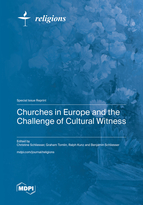Churches in Europe and the Challenge of Cultural Witness
A special issue of Religions (ISSN 2077-1444). This special issue belongs to the section "Religions and Humanities/Philosophies".
Deadline for manuscript submissions: closed (31 January 2023) | Viewed by 21908
Special Issue Editors
Interests: public theology; church and society; Dietrich Bonhoeffer; peace and reconciliation studies; role of religion in sustainable development/SDGs
Interests: christology; church and society; cultural witness; spirituality
Interests: church growth; church and society; new forms of church; liturgy
Interests: early church development; church and society; theology of Paul; early Christian identity discourses; social history of the New Testament
Special Issue Information
Dear Colleagues,
Our time is characterized by a lack of a common vision for the future of European societies. As the COVID-19 pandemic slowly retreats, inspirations for a post-COVID world are found wanting. Brexit is one symptom of the waning cohesive powers of the union of values. Christianity, the (still) dominant religion in Europe, is on the retreat as Christian churches throughout Europe face a steady decline in membership, finances, and moral authority. The narrative of the role of Christian faith in shaping the past and present of European life and culture is in danger of being lost. While the 21st century will be a religious one, according to the Pew Research Center (2015), the predicted global increase in membership of near all major faith traditions, including Christianity, may well bypass Europe.
At the same time, God is far from dead in Europe. The pandemic has prompted numerous theological reflexions and practical engagements from Christian churches and theology throughout Europe, setting “trust against fear”, as the CPCE, representing near 50 million Protestants in Europe, proclaims. Even before COVID-19, the emergence of “public theology” sought to engage as a “cultural witness” by drawing out the relevance of church and theology for the public sphere while taking up public challenges into its theological reflexion and action.
Yet, the big questions remain: What is the role of the Christian churches and theology in Europe? How can we adequately conceive of a constructive interrelationship between Christian churches, culture, and society? Which “social imaginary” (Charles Taylor) can guide the church into the future in Europe? What resources (from biblical, historical, cultural, etc. studies) can be made fruitful? How can the churches find a way to communicate the heart of their animating vision, humbly yet persuasively, within a post-Christian, and even a post-truth society while learning the chastening lessons of past imperialistic hubris?
This Special Issue seeks to provoke debate on established theoretical concepts in the study of the Christian church and its role in European culture and society. At the same time, this Special Issue will provide a platform for the emergence of new conceptual approaches. It will also emphasize the link between theological thinking and practical engagement, including cultural witness, church planting, fresh expression of churches, new monasticism, etc.
We seek to invite contributions from a range of academic disciplines, including interdisciplinary work. We are looking for contributions that engage critically and constructively with the current transformations in the relationship between Christian churches, culture, and society in Europe. We seek both descriptive and normative perspectives on the churches’ contributions to the future of Europe.
To that end, contributions will be included that:
- Analyse the role of Christian churches and theology in different European contexts;
- Offer fresh thinking in theological approaches and practical engagement on the churches’ contribution to the future of Europe;
- Use empirical case studies to formulate new concepts or theories;
- Offer cross-national comparisons of the role of Christian churches in different settings;
- Explore the interaction of Christian theology with new methods of communication;
- Re-examine how the discipline of Christian apologetics might be re-imagined in a post-Christian and arguably ‘post-truth’ world;
- Provide inter-denominational insights on the questions addressed;
- Include the contribution of neglected groups such as women, youth, migrants, etc.;
- Examine the role of Christian churches in contributing to polarisation or inclusion in Europe in the context of new challenges introduced by the COVID-19 pandemic.
Dr. Christine Schliesser
Dr. Graham Tomlin
Prof. Dr. Ralph Kunz
Prof. Dr. Benjamin Schliesser
Guest Editors
Manuscript Submission Information
Manuscripts should be submitted online at www.mdpi.com by registering and logging in to this website. Once you are registered, click here to go to the submission form. Manuscripts can be submitted until the deadline. All submissions that pass pre-check are peer-reviewed. Accepted papers will be published continuously in the journal (as soon as accepted) and will be listed together on the special issue website. Research articles, review articles as well as short communications are invited. For planned papers, a title and short abstract (about 100 words) can be sent to the Editorial Office for announcement on this website.
Submitted manuscripts should not have been published previously, nor be under consideration for publication elsewhere (except conference proceedings papers). All manuscripts are thoroughly refereed through a double-blind peer-review process. A guide for authors and other relevant information for submission of manuscripts is available on the Instructions for Authors page. Religions is an international peer-reviewed open access monthly journal published by MDPI.
Please visit the Instructions for Authors page before submitting a manuscript. The Article Processing Charge (APC) for publication in this open access journal is 1800 CHF (Swiss Francs). Submitted papers should be well formatted and use good English. Authors may use MDPI's English editing service prior to publication or during author revisions.
Keywords
- churches
- European societies
- cultural witness
- public theology
- Christianity
- fresh expression of church
- social imaginary






